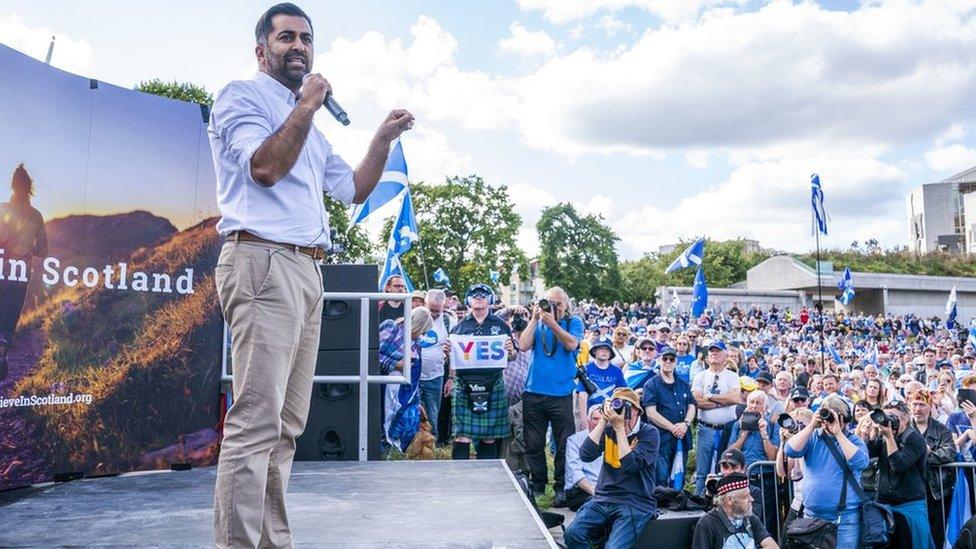Scotland's Yes movement: Inspired or disillusioned?
- Published
What's been happening with Scottish independence? The BBC's Glenn Campbell explains
If all had gone to plan for Nicola Sturgeon, Scots would have been heading to the polls for a second independence referendum.
In June last year, the then first minister announced her intention to stage the vote on 19 October 2023.
Her hopes were dashed by a Supreme Court ruling that she did not have the power to do so, with the SNP forced to return to the drawing board.
On Sunday, the party agreed an independence strategy based on winning the majority of seats - at least 29 - in Scotland at the next general election.
The SNP won 48 seats at the last election in 2019, but recent polling has suggested the party has lost much of its once huge lead over Labour.
Both the Conservatives and Labour have vowed to continue to oppose any calls for another referendum, yet the ambitions of the Yes movement remain.
Mandi McInnes, from Perth, and Beverley Craig, from Crieff, took part in the Chain of Freedom independence event last weekend. It involved members of the Yes movement linking arms in a bid to form a human chain across the central belt.
Standing in line in Glasgow next to the Forth and Clyde canal Mandi said such events showed younger Scots there is still a "huge appetite" for independence and a "positive alternative" to Westminster.
Beverley echoed familiar concerns among the independence supporters that their views were underrepresented in the media.
"There are people who are not necessarily part of the independence movement who think independence has died," she said.
"Friends of mine I met recently said I thought that was gone when Nicola [Sturgeon] went and it was like, well no."
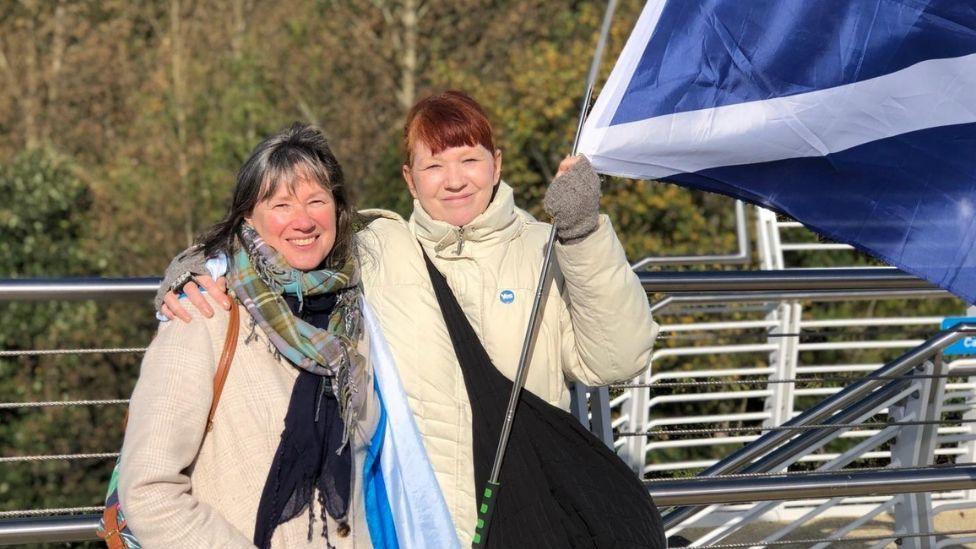
Beverley Craig and Mandi McInnes were among those who took part in the Chain of Freedom event
Wilma Bowie helped organise the Chain of Freedom event.
The Inverness activist told BBC Scotland that more women than men had signed up to take part.
Sir John Curtice, professor of politics at the University of Strathclyde and president of the British Polling Council, said voting intentions among women had been one of the key changes since the 2014 vote - along with a shift in attitudes of young Scots.
In recent years, younger voters have been consistently more likely to back independence than those aged 35 and over, he said.
The polling expert identified Brexit as the major issue in the independence debate. Scotland voted to remain by 62% to 38%, while the UK overall voted to leave by 52% to 48%.
Independence marches
Neil Mackay, 40, helped set up All Under One Banner, a campaign group which has held 39 events across Scotland since 2015.
Its 40th event was scheduled in Edinburgh earlier this month, but was called off due to heavy downpours.
Although that was due to extreme weather, there is a sense among some within the movement that spirits have been dampened in recent years.
Peak attendances for marches came in 2019, when the Brexit debate ensured the constitutional question remained at the forefront of Scottish and UK politics.
Mr Mackay, who lives in Helensburgh, said a second referendum seemed "tangible" then.
In recent years the Yes movement has been fractured by Ms Sturgeon's departure, the police investigation into SNP finances, gender recognition reform and arguments over the path to independence.
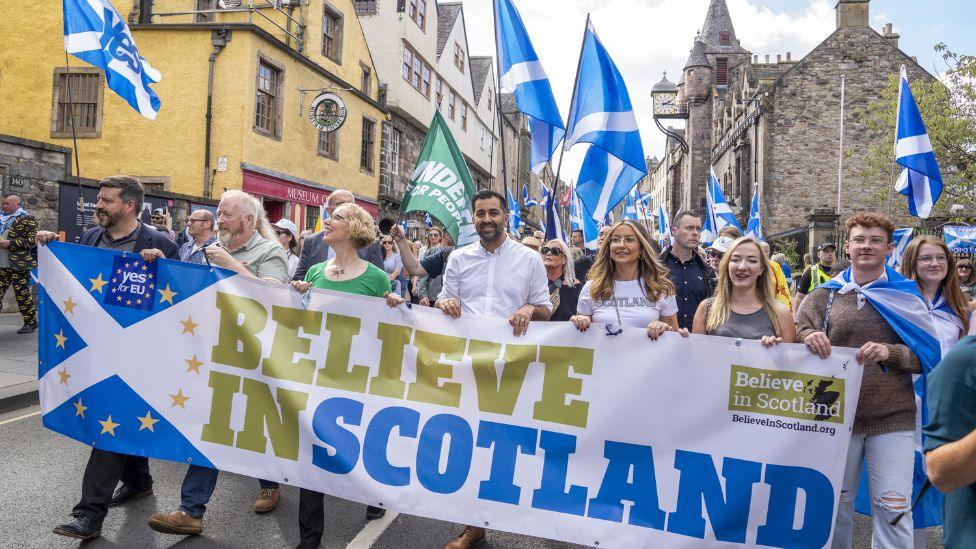
High-ranking Scottish government ministers been front and centre at independence events since Humza Yousaf succeeded Nicola Sturgeon
Mr Mackay told BBC Scotland News that while activists remain optimistic, "countless false summits" have caused people to become "disillusioned" with the political leadership.
Humza Yousaf - who pledged to be the "first activist" after being named as Ms Sturgeon's successor - has sought to strengthen ties with the grassroots movement by attending Yes events.
At the SNP conference this weekend, he urged the SNP and the wider Yes movement to unite behind his independence strategy.
But Mr Mackay said a lack of "drive" in Mr Yousaf's government was embodied by the new plan to achieve independence.
"We know Westminster isn't up for negotiations," he said. "It's a no. It doesn't matter if it's Labour or Tories or whoever."
Mr Mackay identified an invigorated youth movement as the key to building support for independence.
"They need to feel it's imminent for them to get excited about it," he told BBC Scotland News. "I think that's true for everyone really, but especially the youth."
Cameron Garrett was too young to vote in 2014 but started to support independence following the 2016 EU referendum.
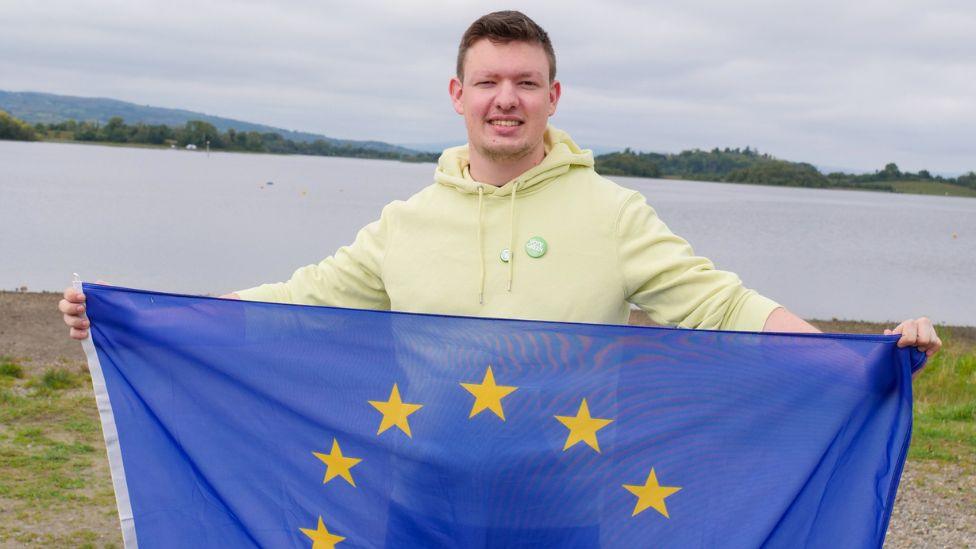
Like many independence supporters, Cameron Garrett is motivated by a desire to rejoin the EU
The 20 year-old, who lives in Dumfries and Galloway, is now co-convener of the Scottish Young Greens.
He said while there was still momentum behind the Yes movement, "the political waters are a bit murkier and a bit choppier" following the Supreme Court ruling that the Scottish government did not have the power to legislate for a referendum without Westminster's consent.
"For one reason or another, obviously it's not happened but it doesn't mean the support has gone anywhere," Mr Garrett told BBC Scotland News.
He said likeminded young people, driven by a desire to tackle the climate crisis and strengthen ties with European neighbours, would be key to driving the campaign.
"People always say young people are the future," the activist said. "Yes we are. But we are also the present.
"Young people for too long have been ignored and let down and not listened to."
Prof Curtice said said support for independence has settled at about 49% in 2023 - excluding undecided voters - following a slight spike after the Supreme Court decision, external.
Judith Allardyce, from Edinburgh, describes herself as an "very enthusiastic" independence supporter who campaigned for Yes ahead of the referendum campaign.
She continued to attend marches and joined the SNP as Brexit pushed the constitutional debate to the forefront of British politics.
But she has not attended a march since before the pandemic, partly due to concerns that such events, while a "good day out", are not helping to build a constitutional consensus.
She said the challenge for people "entrenched" in Yes and No camps was to attract a smaller group of people who could be convinced either way.
"Marches on their own are not going to do anything," she said. "We need to have some kind of plan."
She added: "I don't think they're working to do anything other than maintain the morale of people who are already quite fervently Yes."
While members of the independence movement crave a winning political strategy, Prof Curtice warned the challenge for campaigners was to persuade people that the risks of being outside the European Union were greater than the risks of being outside the UK.
He said: "Until, frankly, both sides come up with a coherent answer to that question, I don't think we'll know how public opinion in Scotland will pan out."
- Published15 October 2023
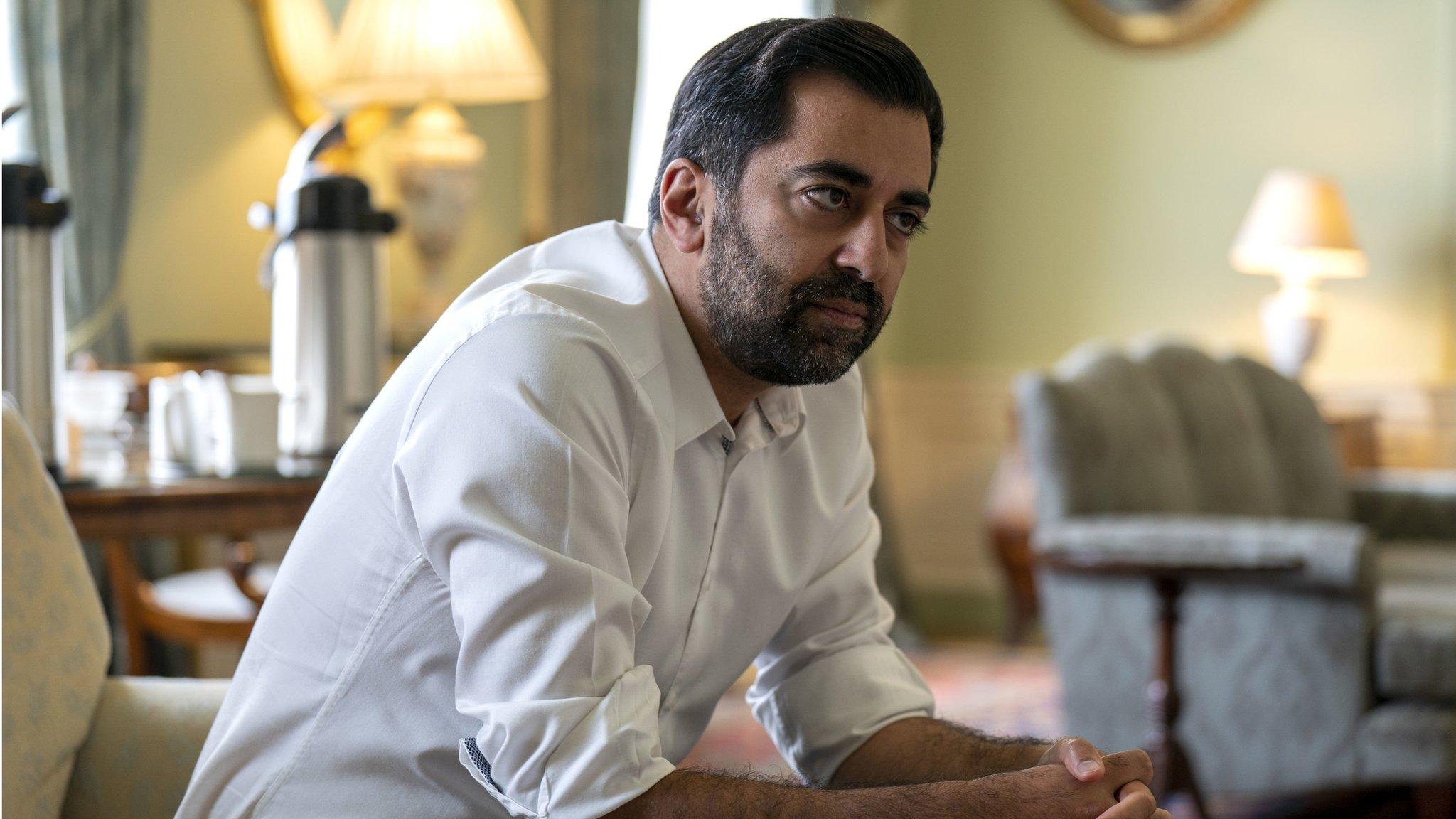
- Published2 September 2023
